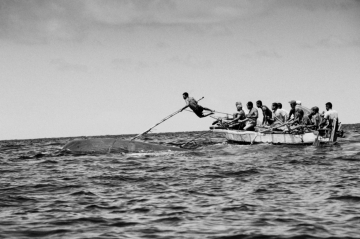Justin E. H. Smith in his Substack Newsletter:
 Among the Domitian questions I enjoy freely pondering, I sometimes wonder how our religious and metaphysical representations of the afterlife would be different if, rather than dying and leaving a rotting corpse for others to dispose of, we instead disappeared in a flash of light, or floated upwards into the sky and out beyond the atmosphere. It recently occurred to me that this latter scenario is at least something like what whales experience when their loved ones die.
Among the Domitian questions I enjoy freely pondering, I sometimes wonder how our religious and metaphysical representations of the afterlife would be different if, rather than dying and leaving a rotting corpse for others to dispose of, we instead disappeared in a flash of light, or floated upwards into the sky and out beyond the atmosphere. It recently occurred to me that this latter scenario is at least something like what whales experience when their loved ones die.
We think of aquatic animals as being able to move freely not just to and fro, but also up and down. In fact most are confined to a fairly narrow zone outside of which they could not survive, either because of the adaptation of their bodies to a particular amount of water pressure, their need for light or for the absence of light, or some other reason still. Most cetacean species inhabit a narrow band of water between the surface and the mesopelagic zone, characterised by a certain amount of light, but no photosynthetic microorganisms. Blue whales, a fairly average species in this regard, can dive to about 300 metres. Sperm whales and certain beaked whales hold the deep-dive record, descending 2500 metres or so to hunt for giant squid and other prey in the abyssopelagic zone.
More here.
